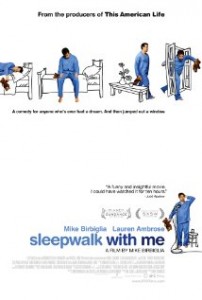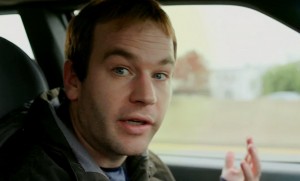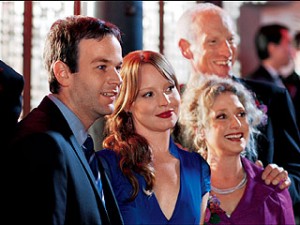“I’m going to tell you a story and it’s true… I always have to tell people that.”
WARNING: This will contain spoilers, although knowing them does not spoil the movie. (Trust me.)
So begins the precious gem of an indie comedy that is Mike Birbiglia’s feature debut as a lead actor, screenwriter, and director, Sleepwalk with Me. The introduction to the film, featuring Mike Birbiglia driving along in his car stopping at a toll booth, immediately recalls Ferris Bueller’s Day Off, the seminal John Hughes classic which featured Matthew Broderick continually breaking the 4th wall as a means providing the audience with a narrative fixture. As a device, it also gives the audience a means by which to relate to the protagonist of the film, which in the case of Sleepwalk With Me is exceptionally important. This is a tough little film, hilarious at times, that refuses to ask simple questions or provide easy answers to its viewers while still entertaining the hell out of its audience. But we’ll get there.
The plot of the film concerns an up-and-coming stand-up comedian who is stagnant in his career and in his love life, being unable to commit to his girlfriend of eight years while struggling to make ends meet as a bartender at a local comedy house in New York. In addition to being unable to process and function in relationships with Abby (his girlfriend played by Lauren Ambrose) and his parents (played with comedic efficiency by Carol Kane and James Rebhorn), Matt Pandamiglio (Birbiglia’s fictionalized representation of himself) also has of late begun acting out his dreams while sleeping. This goes beyond normal sleepwalking, as the first instance we see involves him first attacking a laundry hamper in the middle of the night convinced that it is a jackal. Later, we see him in the throes of a dream where he has won gold in the Dustbuster Olympics, only to topple from the podium/bookshelf that he has been unknowingly balanced upon.
The movie is based upon the comic’s recent publication Sleepwalk With Me and Other Painfully True Stories, which is also based off of his recent off-Broadway performance of the same name, which is based upon much of his stand-up routine, which is based upon Birbiglia’s real-life struggle with REM Behavior Disorder, which results in the aforementioned acting out of dreams.
As a cinematic narrative, the plot would seem to be fairly straightforward. Likeable comedian struggles to break into the world of stand-up comedy; encouraging girlfriend supports him every step of the way, despite growing conflict between them; comedian discovers his own voice, usually something new and profoundly different from what has come before; comedian overcomes personal tragedy/disease/addiction/etc. to triumphantly claim success and the girl as his own. (You can call this the tried and true Ray/Walk the Line narrative, it’s so patented for success.) However, as this narrative comes directly from the man who singularly experienced it, as well as in the form of an independent feature from IFC Films, things aren’t as easy as they might seem. What makes this work is the distinct likeability of Mike Birbiglia as a story-teller and as a performer. Birbiglia plays the Everyman with an effervescent charm that allows for the narrative of Sleepwalk With Me to make several twists and turns that go beyond a simple biopic and transform it into a case study of the modern American artist.
For starters, Birbiglia doesn’t claim to have discovered anything new or groundbreaking in his form of stand-up comedy. During the first third of the film, he struggles to come up with more than 11 minutes of material to fill out his 30 minute time slots. It is not for lack of effort that he is not succeeding; we see him literally jump at every chance he gets, whether it be filling in for five minutes onstage at his workplace or meeting with a two-bit talent agent who eats popcorn out of rolled up headshots backstage. Rather, his jokes just aren’t funny, and he knows it. After a particularly dismal failure opening for a prominent comedian, he laments his struggles with both his career and his relationship over a shared beer. He states that “I didn’t want to get married until absolutely nothing else good could happen in my life.” The comedian replies that “you should use that [in your routine, because] that’s funny.” With this encouragement, Mike begins to incorporate stories of his dying relationship and his sleepwalking disorder into his routine, unbeknownst to Abby.
Mike Birbiglia as a comedian is part of a newer wave of comedians who have found success not by reeling off jokes one after another, a la Michael Richards, Eddie Murphy, Chris Rock, etc., but rather by telling stories of their own lives in a humorous way, a wave that includes others such as Patton Oswalt and especially Louis C.K. Birbiglia explains both his style and the title of the book by stating he “find[s] that if you can go to the painful parts, if you can come out the other side and find comedy in it, then you’re gold,” and we start to see that success by painfully mirroring his growing renown as a comedian in the movie with his parallel relationship woes.
His relationship with Abby is framed by the concept of marriage. Introduced early on by his sister’s engagement, he reveals to Abby that he is not thinking of marriage at any time soon in his life. Abby tries to be supportive, but is swiftly catching baby fever and wants Matt to commit to her as a way of taking their relationship to the next level. You know, what happens in real life. As with real life, things aren’t always that simple. For a myriad of reasons, Matt is not able to make that commitment. Maybe it’s because he sees how his parents are after 40 years of marriage and doesn’t want to fall into that particular trap. Maybe it’s because they’re never around each other, and when they are, they’re met with stony silences.
What’s ultimately suggested by the film is that Matt’s sleepwalking disorder is connected to his struggles as a comedian and in his relationships. Several times throughout his dreams, Abby and his parents make appearances, as well as other frightening images from his everyday life. As he continues to act out his dreams, sometimes dangerously, he repeatedly ignores dealing with it, pushing it aside while he travels for hundreds of miles across the country to his next stand-up gig.
Lauren Ambrose does a remarkable job at walking a fine line within this movie. At no point whatsoever does Abby become unlikeable or an antagonist to Matt or to his career, forcing him to choose between his career and marriage. She remains sweet, loving, and infectiously fun, the kind of girl that we can imagine Matt having fallen in love with and someone that he has been willing to share his life with for eight years. At the same time, she never becomes the victim; her choices are those made by a frustrated woman and they reflect where she is in her life. The audience is never made to feel sorry for her, and she does not overplay her emotions, avoiding the trap of becoming a teary, bubbling, whiny mess that the character very well could have fallen into.
Much of the inherent likeability comes from Mike Birbiglia himself. His humor is self-deprecating yet affectionate, reflective yet interpersonal, and by incorporating his growing success and rising self-confidence throughout the film in a series of smaller montages, we see that it’s easy to like Matt the comedian. When paired with smaller moments such as his interactions with Abby and his obvious desire to make good upon his career, the audience finds that it cannot help but root for Matt. His biting narration adds to our enjoyment of his perspective. There is no clear cut antagonist in this film, so the only conflict must come from within Matt as he tries to balance his career and love life while dealing with his increasingly dangerous sleepwalking episodes.
Matt is by no means perfect. While on the road, the modern day Matt (narrating) is forced to remind the audience that he is the hero, telling the camera to “remember, you’re on my side.” Following this moment, Matt is seduced by a Hooters waitress after a late night show. Fending her off by telling her about Abby, the waitress responds by asking if he understands “the drill” of sleeping with other women on the road. After taking a moment to down several beers, Matt proves that he does understand the drill. It is following this moment that he realizes that he and Abby are doomed, because he cannot guarantee that this action will not happen again.
Naturally, things don’t quite work out that way. Sleepwalk With Me has a narrative that continually keeps the audience guessing despite the conclusion of several important themes sometimes slapping the characters in the face. Mike Birbiglia has appeared on the NPR radio program “This American Life” hosted by Ira Glass several times, and is a veteran of several other radio/internet podcasts such as The Nerdist and The Moth, and his craft of storytelling is obvious. Ira Glass himself served as a screenwriter, and the tight narrative is something that Birbiglia attributes to Glass’s incredibly high standards of revising and revising the story. The resultant screenplay is lean and tight while still allowing for a full exploration of Matt’s disorder, career, and relationships. Many of the instances within the film might be familiar to fans of Birbiglia’s stand-up, yet at the same time, they are here given fresh life and scope beyond what is able to be conveyed through a single man with a microphone.
One thing that adds immensely to Birbiglia’s likeability is his Everyman appeal. Birbiglia is a man who fits few of the profiles of the Hollywood star. During a scene where he runs down a hotel corridor in the throes of a sleepwalking episode, he appears topless where another man of his stature and physique might turn that down. His vulnerability and failures early on are something that many in the target audience of the 25-49 demographic will relate to easily; in the modern recession, it’s hard to get by in any field without picking up the odd bartending or service job to help make ends meet. When that job becomes your day-job, it becomes trying. Matt’s dad at several points throughout the movie places undue pressure on his son, screaming that he “wants to be a comedian, but he’s a bartender” and that he needs to “pick something and stick with it.” That sort of pressure to figure everything out as time goes by is familiar to much of the audience listening to Ira Glass’s radio programs or to podcasts featuring Mike Birbiglia on the internet. We see ourselves in Matt’s shoes because we’ve been there. We’ve all struggled, especially those of us working in the cutthroat artistic field. It’s a hard knock life, and vis-à-vis, it’s easier to imagine the immense amount of stress on Mike/Matt that causes his sleepwalking episodes.
The film’s final image (which I will not spoil here), accompanied by more monologue from Birbiglia, is incredibly powerful, given its intent and nature. After summarizing all of his experiences, Matt has chosen to deal with his problem not by curing it, but by enduring it and making the best out of what he’s got. This can be taken in two separate directions by an audience: the first is that by making the best of what you are given, you can endure all things and triumph; the second is that we never really solve our problems, but become trapped into a half-hearted existence, surrounded by our own personal failings and the carcasses of all that we once thought was good.
Like I said at the beginning, this is not a movie that provides easy answers to simple questions. Which is what makes it more than just another biopic.
This film, an indie darling at Sundance and SXSW, has slowly but surely crept into the national consciousness. It’s hard for a small independent film to gain immediate widespread release, but Birbiglia and Glass have helped to spearhead a marvelous word of mouth campaign that has included both immense support and, at the same time, conspicuous protests:
This has led to a response, in their own way, from the creators:
The resulting movie is a treasure, one that asks tough questions without providing easy answers. Mike Birbiglia is a voice that has plenty to say, and is hilarious to hear, and if Sleepwalk With Me is any indication, we can hope that there will be more ‘painfully true’ stories to pull comedy from in the near future.










